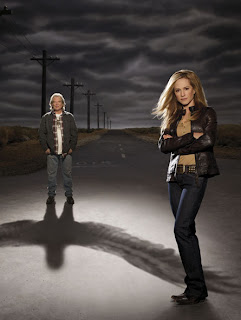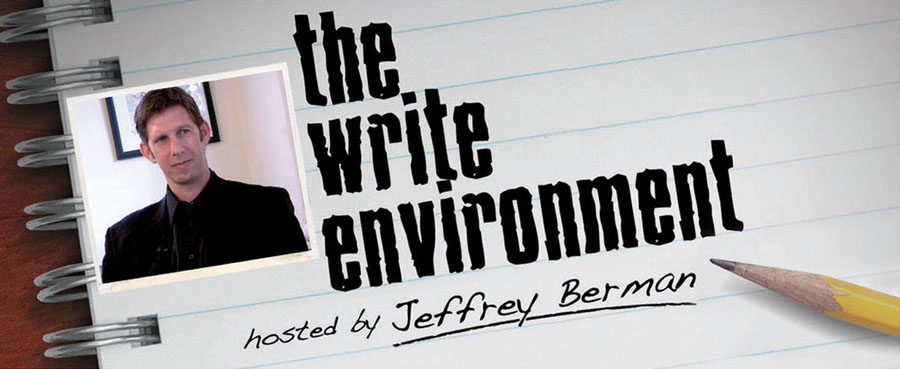In my opinion, cable may be the saving grace for original scripted TV series. Some of the best shows of the last decade have come from cable, The Shield, Rescue Me, Army Wives, Battlestar Galactica , Kyle XY and Saving Grace, to name but a few. The beauty of having a series on cable is that you’re not a slave to the network machines. At thirteen episodes a year, writers can take their time crafting better storylines, writing quality scripts and developing relatable characters because they’re not forced to crank out a grueling twenty-two episodes a year. And while there are fewer jobs available for series writers in cable just now, with the increased number of reality series, the loss of UPN and NBC’s decision to shift the 10 pm slot across the board from Monday to Friday into Jay Leno’s personal property, the demand for better quality driven series is on the rise… and in all likelihood, cable will be there to meet the demands.
Which brings me to this week’s Q&A with one of my good friends and possibly the nicest guy I know, Roger Wolfson. In a cutthroat business built on the backs of other writer’s failures and successes, Wolfson remains one of the sweetest, most down to Earth guys you'll ever meet. Add to that he’s also he’s also a pretty good actor to boot and you’ve got the formula for success. But Wolfson didn’t start out wanting to be a TV writer.
Before becoming a professional writer, Wolfson worked in the US Senate for seven years serving as staff and/or speech writer for four US Senators: Joseph Lieberman, John Kerry, Paul Wellstone, and Ted Kennedy. He has also been Vice President of one of the largest news organizations in the country, has run a multinational strategic consulting firm, and practiced civil rights law.
He arrived in Los Angeles in January of 2003, and by July had earned a staff writer slot on the CBS series, "Century City.” The next year Wolfson was hired by NBC's "Law & Order: Special Victims Unit." While writing for "Law & Order: SVU" he also wrote speeches for, and traveled the country as a surrogate speaker, for the Senator John Kerry Presidential campaign.
In 2005 his episode of "The Closer" entitled "Fantasy Date" garnered Kyra Sedgwick an Emmy Nomination. After "The Closer," Wolfson stayed in the TNT family to write for the first two seasons of "Saving Grace," starring Holly Hunter. He has since begun developing TV series of his own; he has sold two pilots to Sony Studios and is developing both of them with his producer, Neil Moritz. He is also developing a crime procedural with Warren Littlefield, a political drama with Mosaic Media, and a dramady with Provissiero Entertainment.
Jeffrey Berman: What is the most important asset a writer must possess?
Roger Wolfson: Commitment. Only a massive commitment to the art form will provide a writer with the discipline, open-mindedness, desire to work and apply oneself, and stick-to-it-iveness that our craft demands.
 JB: How does writing for a series on a cable network, such as Saving Grace, differ from working on a series for one of the major networks like Law & Order: Special Victims Unit? Are there any advantages?
JB: How does writing for a series on a cable network, such as Saving Grace, differ from working on a series for one of the major networks like Law & Order: Special Victims Unit? Are there any advantages?
RW: Here's conventional wisdom: broadcast network shows pay better, but demand a lot more time and a lot more of your year, giving you less time to work on your own projects. Broadcast Network shows tend to take fewer creative risks than shows on Cable. And Cable networks tend to invest more heavily in their shows than the broadcast networks; they develop fewer shows, and spend more energy keeping those shows on the air.
Personally, I recommend both to any writer. Each is a unique and powerful creative experience. The challenges will make you grow as a writer. Learning how to work with people, learning that any creative endeavor is a team effort and you simply can't bring your ego into the process, is incredibly valuable. On any show you have no choice: show up to serve, show up to help out and chip in - or go home.
JB: What is the most important thing to you when writing an episode of a TV series: plot, character, conflict, or something else?
 RW: There are character writers who say that character is everything. There are procedural writers who say that plot is everything. Both will say that conflict is key. For me, this is like asking which is more important - the left brain or the right. I would say that any great work of drama involves both sides of the brain working in sync. And any great script has character AND plot. I don't like simple character studies. And I don't like simple mathematic shows that structure a great story without any depth of character. I say, have it all. Aim high.
RW: There are character writers who say that character is everything. There are procedural writers who say that plot is everything. Both will say that conflict is key. For me, this is like asking which is more important - the left brain or the right. I would say that any great work of drama involves both sides of the brain working in sync. And any great script has character AND plot. I don't like simple character studies. And I don't like simple mathematic shows that structure a great story without any depth of character. I say, have it all. Aim high.
 JB: How do you approach writing an episode for a series like The Closer once the story has been approved?
JB: How do you approach writing an episode for a series like The Closer once the story has been approved?
Just remember above all that you are here to help the showrunner, to make his or her job easier. Now, this does not mean being obsequious or failing to bring your own perspective and fresh ideas to the process. But do those things only in as much as doing so is helpful to the showrunner. TV writing is an odd job in that fashion. It's as if you are writing a chapter of a great novelist's book. Your job is to write a chapter that fits and flows with the rest of the novel - NOT one that stands out as different - with an awareness that you may get thanked in the credits, but the novelist's name (and only his or her name) will appear on the cover. It's his/her book. The more you think of being on staff in that way, the more successful you'll be.
JB: Can you offer some tips for writing authentic dialogue that is to the point, focused, and moves the story forward?
 RW: First and foremost, read it out loud. Also, have friends read it aloud in front of you. Force yourself to listen. Make sure it sounds real. Make sure it sounds like the way people talk. If it sounds even like a hint of exposition, if it sounds obvious - throw it out. On Saving Grace, Nancy Miller is a stickler for knowing up front what your point of the scene is. The point of the scene should be something fairly simple. And it should bubble up from the dialogue without seeming forced. Almost accidentally, almost (even) unnoticed. The rest of the scene is just slice of life, people doing what people really DO, on a daily basis.
RW: First and foremost, read it out loud. Also, have friends read it aloud in front of you. Force yourself to listen. Make sure it sounds real. Make sure it sounds like the way people talk. If it sounds even like a hint of exposition, if it sounds obvious - throw it out. On Saving Grace, Nancy Miller is a stickler for knowing up front what your point of the scene is. The point of the scene should be something fairly simple. And it should bubble up from the dialogue without seeming forced. Almost accidentally, almost (even) unnoticed. The rest of the scene is just slice of life, people doing what people really DO, on a daily basis.
Another way I make sure I do that is to keep my favorite of the showrunner's scenes in front of me as I write. Before I ever write a scene, I just take a second, read that favorite scene, THEN write. And then I compare - does my scene flow like that one? Is it as funny, easy, real, true, simple?
Lastly, avoid parentheticals like they are the plague itself. Use action lines, but treat them as if they are poisonous and must be kept to a bare minimum. Be brutal, even cruel about trimming excess out of your script. You will be glad you did.
JB: What is the secret to working as a TV writer?
RW: Developing your skills as a writer, and writing spectacular specs, is the only way to do it. Great work will always find an audience. The way to get there, for me, is to cultivate a huge braintrust of people I can count on to read my work and give me honest feedback. I don't develop a pitch until practically all of them say it's fantastic. I don't flesh out an outline until practically all of them tell me the outline is more than good enough to go. I don't call the script "done" until practically every member of my thirty person braintrust has said, with certainty, that this script is superb, one of the best they've ever seen. I will work myself endlessly to get that point. And, in gratitude to my friends who read draft after draft of my work, I take my braintrust friends out to dinner, I take them sailing on my boat, and I am always ready to read their scripts with the same zeal they read mine. And when I get my own show on the air, they know I will find a place for them. And since they are familiar with my abilities, I can assume the same goes for me, if they get their shows on the air, first.





